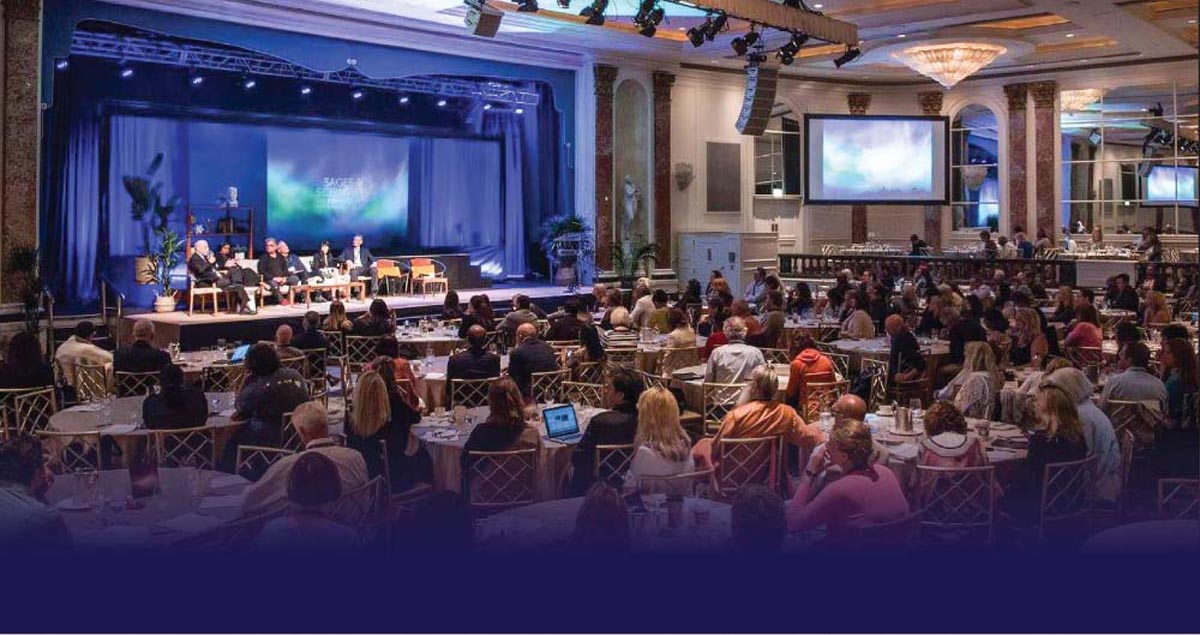Boldly addressing the big question: Who, or What, Am I?
In september of 2016, hinduism today attended the Chopra Foundation’s three-day Science and Sages Symposium in Los Angeles, California, held at the prestigious Beverly Wilshire Four Seasons hotel. Even at a cost of $1600 per person, the room was filled with some 500 knowledge-hungry teachers of yoga, wellness and art. The conference’s livestream peak had 250,000 people watching, with an average of about 100,000 over the course of the three days.
Each day had a different theme and featured philosophers, doctors, scientists, musicians, artists, physicists, neurologists and astronomers. Each presenter had the stage for about 20 minutes, and at the end of the set all gathered for a panel discussion moderated by Deepak Chopra.
Day one’s theme was “Cosmos, Physics and Consciousness: The Deep Mystery of Existence.” Our morning began with a one-hour holographic HumaGram [sidebar left] presentation of Dr. Chopra explaining a 5,000-year history of our understanding of consciousness and where we stand today with the hard problem—what is consciousness and how does it relate to our perceived reality? Chopra and his presenters are working to tie the two together with a monistic answer: The universe and consciousness are the same.
Two presenters on dark matter, an incredibly dense topic filled with unknowns, opened up the landscape for out-of-box thought. Dark matter, along with dark energy, is hypothesized to comprise around 95 to 98 percent of the universe.
Topics for the afternoon included philosophy, awareness, the akashic field and quantum physics. Along with Chopra, Subhash Kak and Menas Kafatos related all of the conference’s teachings thus far to Hinduism, specifically to Vedanta and Saivism.
On day two, Chopra and the other presenters took us through wellness and understanding of both the Earth and ourselves, themed “Nature, Well-being, Love and Spirit.” Topics included meditation, mental health, climate change, neuroscience, microbiome health, genetics, epigenetics and philosophy.
Cutting-edge information was presented by Rob Knight, a professor working on microbiome discoveries—aka, “gut health.” The Center for Microbiome Innovation is discovering the critical importance of the human gut and how essential its balance of bacteria is for optimal health. He shared some amazing therapies that use the bodies’ bacteria as alternatives to medicine.
Rudolph Tanzi of Harvard Medical School, co-author (with Chopra) of Super Brain and Super Genes, presented his work on brain health and his lab’s new findings on Alzheimer’s disease.
Day three, “Technology and Creativity,” was devoted to showing how new technology can improve the quality of life. The over-arching message was that soon much of society will be using smart devices to enhance its day-to-day activities. The presenters introduced meditation devices, sleep aids, brainwave tuners and ideas for future tech gizmos that we could wear as clothing. One panelist was wearing about six devices across his body to show how small and inconspicuous mobile devices are getting.
At the end we sat down with Chopra and asked, “What are you and the whole movement bringing to humanity that’s new, that didn’t exist in the Indian paradigm?”
“In the Indian paradigm the ultimate goal,” he responded, “of life is moksha, or finding your true Self. As fundamental reality, atman is Brahman; and until you do that, you have what is called suffering. What we’re trying to do is go beyond the few Indian luminaries. India is regarded as a great spiritual culture, but you have to remember that the sages of the Upanishads were not that many. I mean, you can count them on one hand. We revere them precisely for that fact that they were luminaries.
“Their message was so great that it has survived. But what we now need is millions of luminaries. And if we have that, we can have a more just, sustainable, healthy, joyful and peaceful world. I think we need to bring forward that knowledge, that wisdom.
“We have moved from the agricultural age into the age of information. Now we are moving to a knowledge-based society, but how about a wisdom-based society—wisdom being that knowledge that can heal ourselves, heal our collective humanity, heal the Earth, and bring healing to all sentient beings? The word health, the word healing, the word holy are all the same word. So health is the return of the memory of wholeness. Today we can bring that through technology, through social media, through education and through collective engagement.”


